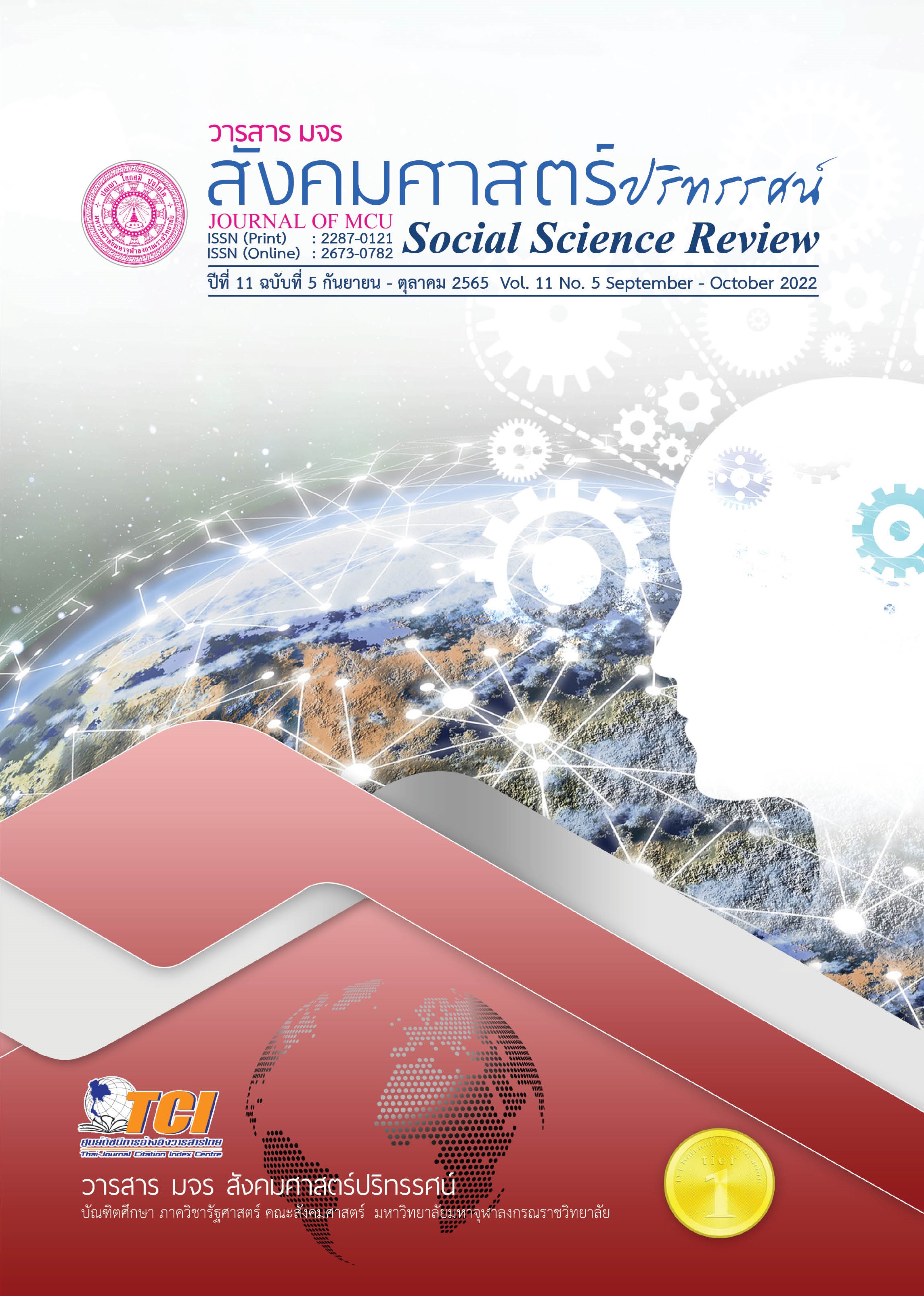การพัฒนาความสามารถในการทำวิจัยของนักศึกษาประกาศนียบัตรวิชาชีพครู โดยใช้วิธีการสอนแบบห้องเรียนกลับด้าน
คำสำคัญ:
ห้องเรียนกลับด้าน, การเรียนการสอนวิจัยทางการศึกษา, นักศึกษาประกาศนียบัตรวิชาชีพครูบทคัดย่อ
การวิจัยนี้มีวัตถุประสงค์ (1) เพื่อศึกษาความสามารถในการทำวิจัย (2) เพื่อเปรียบเทียบผลสัมฤทธิ์ทางการเรียนวิชาวิจัยทางการศึกษา และ (3) เพื่อศึกษาความพึงพอใจของนักศึกษาประกาศนียบัตรวิชาชีพครูต่อวิธีการสอนแบบห้องเรียนกลับด้าน การวิจัยครั้งนี้ใช้ระเบียบวิจัยเชิงปริมาณ โดยใช้แบบทดสอบความสามารถในการทำวิจัย แบบวัดผลสัมฤทธิ์ทางการเรียนด้านวิจัย และแบบประเมินความพึงพอใจหลังจัดการเรียนรู้เป็นเครื่องมือ กลุ่มตัวอย่าง คือ นักศึกษาระดับบัณฑิตศึกษาหลักสูตรประกาศนียบัตรวิชาชีพครู มหาวิทยาลัยเซนต์จอห์น ที่ลงทะเบียนเรียนวิชาวิจัยทางการศึกษา จำนวน 30 คน ใช้วิธีการสุ่มตัวอย่างอย่างง่าย วิเคราะห์ข้อมูลด้วยค่าเฉลี่ย ส่วนเบี่ยงเบนมาตรฐาน และการทดสอบ Paired sample t-test
ผลการวิจัย พบว่า (1) ผลการประเมินความสามารถในการทำวิจัย พบว่า นักศึกษามีความสามารถในการทำวิจัยอยู่ในระดับดีมาก (= 4.35, SD= 0.74) (2) คะแนนเฉลี่ยของการทดสอบวัดผลสัมฤทธิ์ทางการเรียนวิชาวิจัยทางการศึกษา หลังจัดการเรียนรู้โดยใช้วิธีการสอนแบบห้องเรียนกลับด้าน (
= 22.43, SD = 3.44) มีค่าเฉลี่ยสูงกว่าก่อนเรียน (
= 19.07, SD = 3.68) อย่างมีนัยสำคัญทางสถิติที่ระดับ 0.05 (3) ผลการประเมินความพึงพอใจของนักศึกษาต่อวิธีการสอนแบบห้องเรียนกลับด้านโดยภาพรวม มีความพึงพอใจมากที่สุด (
= 4.69, SD = 0.53)
เอกสารอ้างอิง
กัลยา วานิชย์บัญชา. (2560). การวิเคราะห์สถิติขั้นสูงด้วย SPSS for Windows (พิมพ์ครั้งที่ 12). กรุงเทพฯ: ภาควิชาสถิติ คณะพาณิชยศาสตร์และการบัญชี จุฬาลงกรณ์มหาวิทยาลัย.
จตุภูมิ เขตจัตุรัส. (2560). ผลการใช้กิจกรรมการเรียนการสอนที่ใช้วิจัยเป็นฐานเพื่อพัฒนา ความสามารถในการทำวิจัยของนักศึกษาบัณฑิตศึกษา. วารสารนานาชาติ มหาวิทยาลัยขอนแก่น สาขามนุษยศาสตร์และสังคมศาสตร์, 7(2), 100-119.
ดวงพร เขียวพระอินทร์. (2560). การพัฒนาผลสัมฤทธิ์ทางการเรียนรายวิชาชีววิทยาและทักษะการวิจัยของนักเรียนชั้นมัธยมศึกษาปีที่ 4 ที่จัดการเรียนรู้โดยใช้การวิจัยเป็นฐานร่วมกับแนวคิดการกลับด้านชั้นเรียน. Veridian E-Journal ฉบับภาษาไทย สาขามนุษยศาสตร์ สังคมศาสตร์ และศิลปะ, 10(2), 392-408.
นิภา กู้พงษ์ศักดิ์. (2560). ผลสัมฤทธิ์ทางการเรียนวิชาภาษาไทยเพื่อการสร้างสรรค์ และความ พึงพอใจต่อวิธีการสอนแบบห้องเรียนกลับด้าน. วารสารบัณฑิตศึกษา มหาวิทยาลัยราชภัฏวไลยอลงกรณ์ ในพระบรมราชูปถัมภ์, 11(1), 55-67.
ประภัสสร วงษ์ดี. (2562). รูปแบบการเรียนรู้โดยใช้โครงงานเป็นฐานเพื่อส่งเสริมความสามารถในการทำวิจัยในชั้นเรียนของนักศึกษาครูสาขาช่างอุตสาหกรรม, วารสารศึกษาศาสตร์ มหาวิทยาลัยนเรศวร, 21(1), 109-126.
พัชราภรณ์ พิลาสมบัติ และดวงกมล จงเจริญ. (2565). ทักษะการวิจัยของครูนักวิจัยเพื่อพัฒนาการจัดการเรียนการสอน. วารสารนวัตกรรมและการจัดการ, 7(1), 166-178.
สำนักงานคณะกรรมการศึกษาแห่งชาติ. (2545). พระราชบัญญัติการศึกษาแห่งชาติ พ.ศ.2542. กรุงเทพฯ: สำนักงานคณะกรรมการศึกษาแห่งชาติ.
Abeysekera, L. & Dawson P. (2015). Motivation and cognitive load in the flipped classroom: definition, rationale and a call for research. Higher Education Research and Development, 34(1), 1–14.
Alamri, M. M. (2019). Students’ academic achievement performance and satisfaction in a flipped classroom in Saudi Arabia. International journal of technology enhanced learning, 11(1), 103-119.
Alsaleh, N. J. (2020) Flipped classrooms to enhance postgraduate students’ research skills in preparing a research proposal. Innovations in Education and Teaching International, 57(4), 392-402.
Bishop, J. L. & Verleger M.A. (2013). The flipped classroom: a survey of the research. 120th ASEE national conference and exposition, Atlanta. Washington: American Society for Engineering Education.
Bergmann, J. & Sams, A. (2012). Flip your classroom: reach every student in every class every day. Washington: Internal Society for Technology in Education.
Eisinga, R. et. al. (2012). The reliability of a two-item scale: Pearson, Cronbach or Spearman-Brown?. International Journal of Public Health, 58(4), 637-42.
Flumerfelt, S. & Green, G. (2013). Using lean in the flipped classroom for at risk students. Educational Technology & Society, 16(1), 356-366.
Love, B., Hodge, A. Grandgenett, N. & Swif, A.W.T. (2014) Student learning and perceptions in a flipped linear algebra course. International Journal of Mathematical Education in Science and Technology, 45:(3), 317-324
Milman, N. (2012). The flipped classroom strategy: What is it and how can it be used?. Distance Learning, 9(3), 85-87
ดาวน์โหลด
เผยแพร่แล้ว
รูปแบบการอ้างอิง
ฉบับ
ประเภทบทความ
สัญญาอนุญาต
ลิขสิทธิ์ (c) 2022 วารสาร มจร สังคมศาสตร์ปริทรรศน์

อนุญาตภายใต้เงื่อนไข Creative Commons Attribution-NonCommercial-NoDerivatives 4.0 International License.
เพื่อให้เป็นไปตามกฎหมายลิขสิทธิ์ ผู้นิพนธ์ทุกท่านต้องลงลายมือชื่อในแบบฟอร์มใบมอบลิขสิทธิ์บทความให้แก่วารสารฯ พร้อมกับบทความต้นฉบับที่ได้แก้ไขครั้งสุดท้าย นอกจากนี้ ผู้นิพนธ์ทุกท่านต้องยืนยันว่าบทความต้นฉบับที่ส่งมาตีพิมพ์นั้น ได้ส่งมาตีพิมพ์เฉพาะในวารสาร มจร สังคมศาสตร์ปริทรรศน์ เพียงแห่งเดียวเท่านั้น หากมีการใช้ภาพหรือตารางหรือเนื้อหาอื่นๆ ของผู้นิพนธ์อื่นที่ปรากฏในสิ่งตีพิมพ์อื่นมาแล้ว ผู้นิพนธ์ต้องขออนุญาตเจ้าของลิขสิทธิ์ก่อน พร้อมทั้งแสดงหนังสือที่ได้รับการยินยอมต่อบรรณาธิการ ก่อนที่บทความจะได้รับการตีพิมพ์ หากไม่เป็นไปตามข้อกำหนดเบื้องต้น ทางวารสารจะถอดบทความของท่านออกโดยไม่มีข้อยกเว้นใดๆ ทั้งสิ้น





